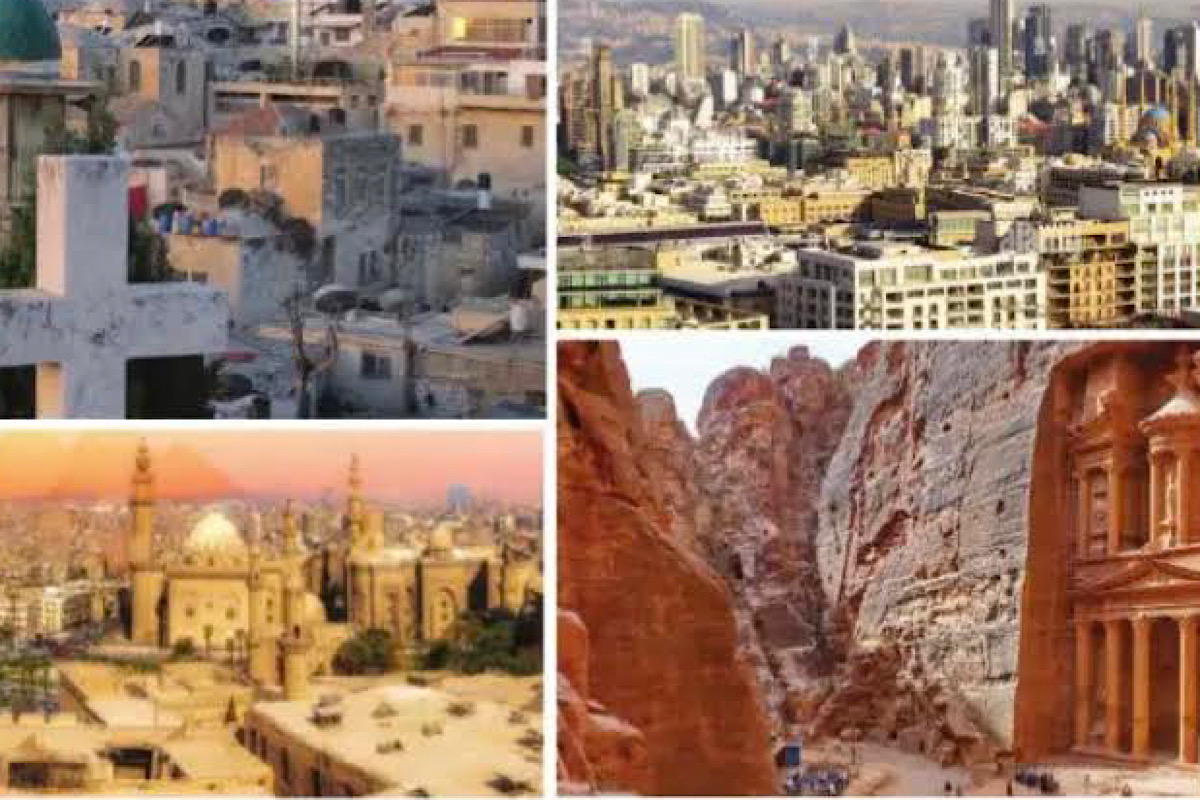The Middle East is a geographical region where Europe, Africa and Asia meet. It is the gateway to three continents. According to Encyclopaedia Britannica, it is an unofficial and imprecise term that now generally encompasses the lands around the southern and eastern shores of the Mediterranean Sea ~ notably Egypt, Jordan, Israel, Lebanon and Syria as well as Iran, Iraq and the countries of the Arabian Peninsula. Afghanistan, Libya, Turkey and Sudan are sometimes also included.
The term was used by Western geographers and historians to describe the region from the Persian Gulf to Southwest Asia. Near East is sometimes used to describe the same area. The United Nations uses the term Middle East in their literature, reports, documents and records. The geo-politics of the Middle East was dominated by the US for many years in the aftermath of World War II.
With the goal of preventing the Soviet Union from gaining influence, American foreign policy was designed to provide extensive support in various forms to anti-communist and anti-Soviet regimes. Among the top priorities for the US was its support for the state of Israel against the Soviet-backed neighbouring Arab countries during the peak of the Arab-Israeli conflict.
The US also came to replace the United Kingdom as the main security patron for Saudi Arabia as well as other Arab states of the Persian Gulf in order to ensure a stable and steady flow of oil. American influence in the Middle East has reduced in recent years, most significantly since the Arab Spring. As of now, the US has diplomatic relations with every country in the Middle East except Iran, with whom relations were severed after the 1979 Islamic Revolution, and Syria, with whom relations were suspended in 2012 following the outbreak of the civil war. Currently the US government has two priorities in the Middle East.
These are resolving the Israeli- Palestinian conflict and limiting the spread of weapons of mass destruction among regional states, particularly Iran. Iran’s economy is in a dire situation due to US sanctions and ever decreasing value of the rial, the national currency. As per reports, it is 55 per cent weaker than a year before.
The devaluation has had an undeniable effect on inflation; especially for food items. US Foreign Policy as reflected in National Security Strategy 2022 advises regional actors in the Middle East to strengthen deterrence, while using diplomacy to de-escalate tensions and reduce risks of new conflicts. America’s strategic interest has now shifted to the Indo-Pacific.
The Middle East as a region is important to Russia because of its geographical proximity, its rich source of hydrocarbons and due to its social and political instability. Moscow’s withdrawal from the Middle East under then president Mikhail Gorbachev at the start of the first Gulf War marked the decline of the Soviet Union’s superpower status. Russia’s reappearance as a player in the Middle East under President Vladimir Putin has the aim of restoring the country’s position as a great power outside the former USSR.
With the start of the military intervention in Syria in 2015, and the USRussian diplomatic effort that accompanied it, the Middle East has become a key testing ground for Russia’s attempt to return to the global stage. Russia has been pursuing a policy of supporting energy prices by coordinating policies with the principal oil and gas producers in the Gulf.
Another factor for Russia’s geopolitical interest in the Middle East is containing and diminishing extremism and radicalism that might otherwise spill over into Russia and the post-Soviet neighbourhood. Russia has about 12 per cent Muslim population mostly concentrated in the North Caucasus and Volga river basin. Russia’s concern for domestic stability is of paramount importance. Russia considers the Middle East as one of the world’s most volatile regions. Unlike the USA, Russia has diplomatic relations with all countries of the Middle East.
The Middle East does not have the same priority for Russia now as the war in Ukraine demands a lot of resources. But the fundamental interest in the region has not changed. Due to these reasons, the USA and Russia are not greatly involved in the Middle East at present. This has provided diplomatic space for China to move in. In March, Iran and Saudi Arabia signed an agreement restoring diplomatic relations after years of hostility.
This reconciliation was mediated by China giving an indication of the country’s growing strategic interests in the Middle East. Iran and Saudi Arabia have for long been involved in a proxy war in Yemen over the issue of support to Houthi rebels. The long-running conflict heated up in January 2016 following the execution of an influential Shia scholar by the Saudis. It is reported that ensuing attacks on Saudi facilities by Houthi rebels using Iranian drones and missiles raised hostilities to a new level. The two countries severed diplomatic relations. China’s role in this reconciliation and mediation is an integral part of President Xi Jinping’s foreign policy agenda in the Middle East to promote investment and trade.
Foreign Affairs journal in its 22 March 2023 issue has stated, “This landmark agreement has the potential to transform the Middle East by realigning its major powers, replacing the current Arab-Iranian divide with a complex web of relationships and weaving the region into China’s global ambitions. For Beijing, the announcement was a great leap forward in its rivalry with Washington.” China’s relationship with the Middle East revolves around energy demand and the Belt Road Initiative (BRI) launched in 2013. As early as 2015, China officially became the biggest global importer of crude oil with almost half of its supply coming from the Middle East; of this, Saudi Arabia is the largest source of imports.
BRI is a global infrastructure development strategy adopted by the Chinese government to invest in nearly 70 countries in Asia, Asia-Pacific, Europe and Africa which make up more than sixty per cent of the world population. Situated at the confluence of three continents, with important trade routes and sea lanes, the Middle East is important to the future of the BRI which is designed to place China at the centre of global trade and networks. Geographical location of Iran is ideal and propitious for this purpose.
Thus for China, both Saudi Arabia and Iran are equally important. China has a vision of a multi-polar order in the Middle East based on noninterference in and partnerships with other states, one in which the country will promote stability through developmental peace rather than the Western notion of democratic peace. BRI was incorporated in the Constitution of China in 2017. It has a completion date of 2049 that will coincide with the centennial anniversary of the founding of the country.
The proposed investment is over one trillion US dollars. An expert has commented, “China has already become a more important economic partner than the United States to practically every country in wider East Asia. From economic power proceeds political power; from political power proceeds foreign policy power; and from foreign policy power proceeds strategic power. That is China’s strategy.”
The breakthrough agreement between Iran and Saudi Arabia highlights China’s willingness to play the role of mediator in the Middle East and shore up its investments and interests in the Persian Gulf. In February 2023, China issued a concept paper on the Global Security Initiative (GSI).
According to China’s Ministry of Foreign Affairs, GSI calls on countries “to adapt to the profoundly changing international landscape in the spirit of solidarity and address the complex and intertwined security challenges with a win-win mindset.” GSI aims to “eliminate the root causes of international conflicts, improve global security governance, encourage joint international efforts to bring more stability and certainty to a volatile and changing era and promote durable peace and development in the world.”
GSI is opposed to building national security on the basis of insecurity in other nations. Whether the Global Security Initiative of China will create a better world is doubtful. Critics have described the GSI as a way of increasing China’s global influence. Hence GSI may not receive support from other countries. It may even remain a non-starter. After all, the Security Council has the primary responsibility for the maintenance of international peace and security.
The Chinabrokered agreement in the Middle East has the potential of facilitating the rise of a new antiwestern global order and excluding the United States from a new regional arrangement. But the dangers of a totalitarian state and authoritarian consolidation forging closer links with autocratic regimes in the oil rich Middle East should be seen in proper perspective.
The proposed new order conceals more than it reveals. The deficits in peace, development, security and governance are growing and the world is once again at the crossroads of history. Future international order is uncertain and global economic uncertainty looms large.
Respect for territorial integrity, sovereignty and global cooperation for achieving sustainable development goals, dignity of and respect for human rights, promotion of democracy are the remedies for a better and peaceful world.
(The writer is a former central civil service officer who retired from the Ministry of Defence)











